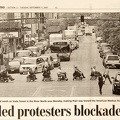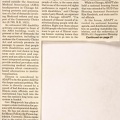[Headline] Seeking doctors' support for housing options other than nursing homes for long-term care, activists close down headquarters' entrances
By Mary Owen
Tribune staff reporter
Larry Lawson says he lost his independence after a stroke and brain aneurysm four years ago.
Paralyzed on his left side, the former Cook County employee now must use a wheelchair. His doctor gave him only one choice for long-term living: a nursing home on Chicago's South Side.
"I've been a refugee in the nursing-home system," said Lawson, 57. "I am able enough to live in my apartment with the help of social services. I would like to have my own place."
Lawson was one of 200 disabled protesters who blocked the entrances to the American Medical Association's headquarters in the River North area Monday for more than three hours in a demonstration over housing options for people with disabilities.
The protesters from the advocacy group ADAPT want the AMA, the nation's leading physicians group, to endorse federal legislation that aims to pro-vide more access to community-based services. Under the cur-rent system, which advocates have criticized for more than a decade, seniors and disabled patients are often forced to live in nursing homes to get the services they need, organizers say.
"There's a myth that nursing homes are a necessary and important option. But we disagree with that," said Rene David Luna, a wheelchair user who works for Access Living, a Chicago advocacy group for people with disabilities. "It shouldn't be an option at all."
Protesters made their way from the Crowne Plaza, 733 W. Madison St., west of the Loop, to the AMA building at Grand Avenue and State Street. Police blocked traffic as protesters traveled in a single-file line along the sides of Madison, La-Salle, Lake and State Streets.
When the demonstrators arrived at the AMA building, they blocked four entrances and a lower-level parking garage.
About 1:30 p.m., police issued 42 tickets and removed protesters from the building's north entrance to allow for office employees to leave. About 2 p.m., the group ended its blockade of the other three entrances and the garage entrance.
The AMA has more than 700 employees on 14 floors in the building. The other half of the building is occupied by other tenants, who also were left standing in the lobby as building officials locked the doors to the entrances. One woman in-side the building was taken away by paramedics when she became "hysterical" at the thought of being trapped inside the building, an AMA official said.
Outside, protesters held signs that said "AMA don't lock us away" and "Now you know what it's like to be stuck in a nursing home."
Protesters said doctors often refer disabled people to the nursing-home system without exploring possibilities such as home-care services that would allow them to live more independently. They want AMA officials to endorse the Community Choice Act, a bill introduced in Congress earlier this year that would provide more options, including allowing a patient to use Medicaid dollars to live in an apartment rather than a nursing home.
"Literally, [doctors] force people into nursing homes with a swipe of a pen," said Randy Alexander, 37, a wheelchair user from Memphis. "It's about dignity. People have a right to decide where they want to live."
Organizers acknowledge that doctors are not the sole deci-sion-makers when determining long-term care for patients, but they do provide guidance and outline patients' options. And too often nursing homes are portrayed as the only viable option, they said.
"What we're trying to change is the long-term health-care system," said Gary Arnold of Access Living. "The AMA has a lot of influence over that. We feel like their word would carry a lot of clout."
In an Aug. 30 letter to ADAPT, AMA Executive Director Michael Mayes told the group that the association "supports home and community-based care, when medically appropriate, as an alternative to institutional care."
An AMA official said the organization met with ADAPT this summer. The meeting led to the association's council on legislation to review the proposed act. A council recommendation is expected later this month.
At that point, the AMA's board of trustees could decide whether the association will endorse the legislation or put it to a vote by the membership.
The protest was part of a biannual national meeting of people with disabilities from across the country. ADAPT held a forum on affordable and accessible housing Sunday, and its planning two more protests this week. The group would not dis-close what or where the other demonstrations would be.
mowen@tribune.corn
- Created on
- Tuesday 23 July 2013
- Posted on
- Friday 18 December 2020
- Albums
- Visits
- 212
- Rating score
- no rate
- Rate this photo


0 comments